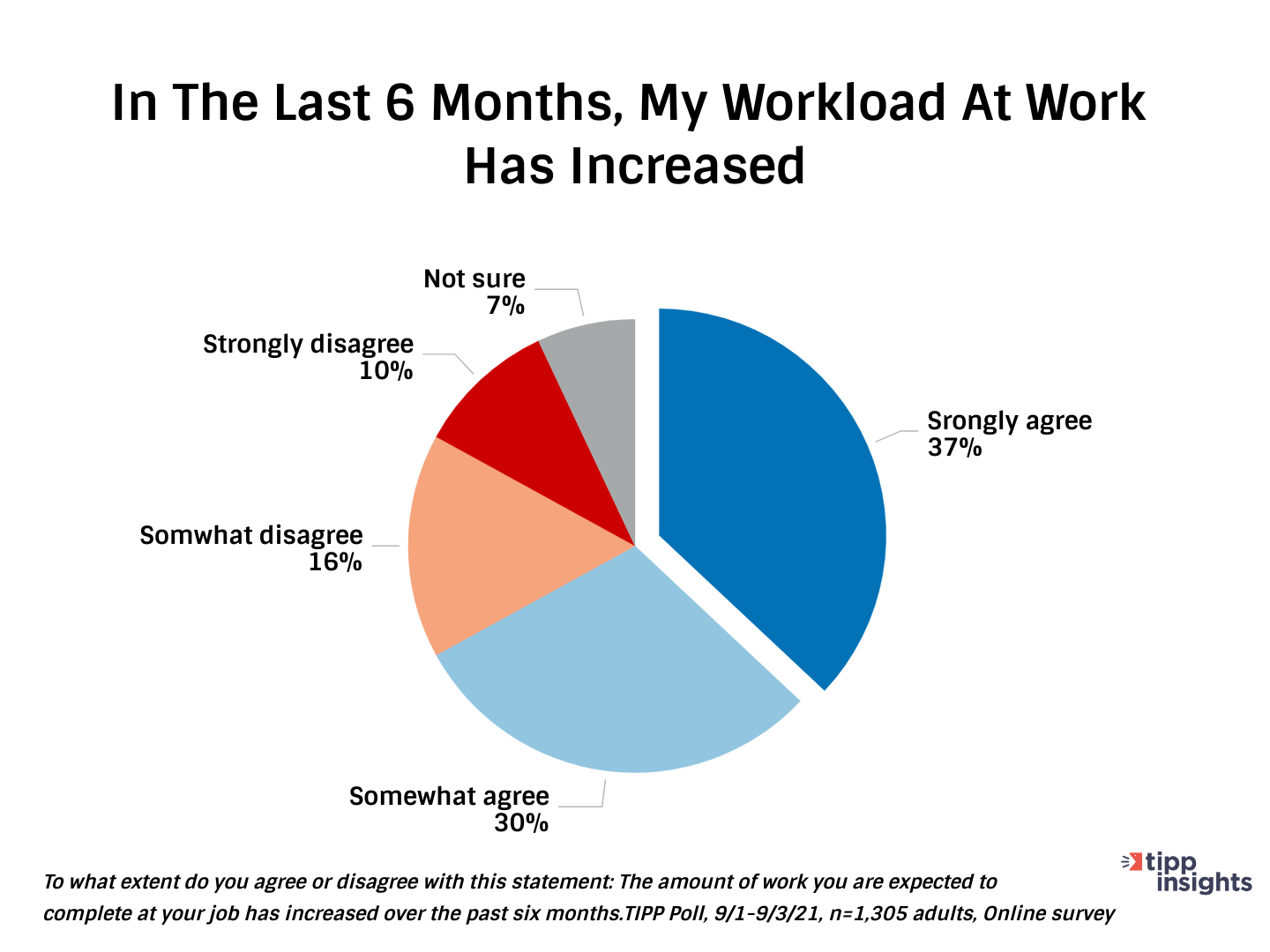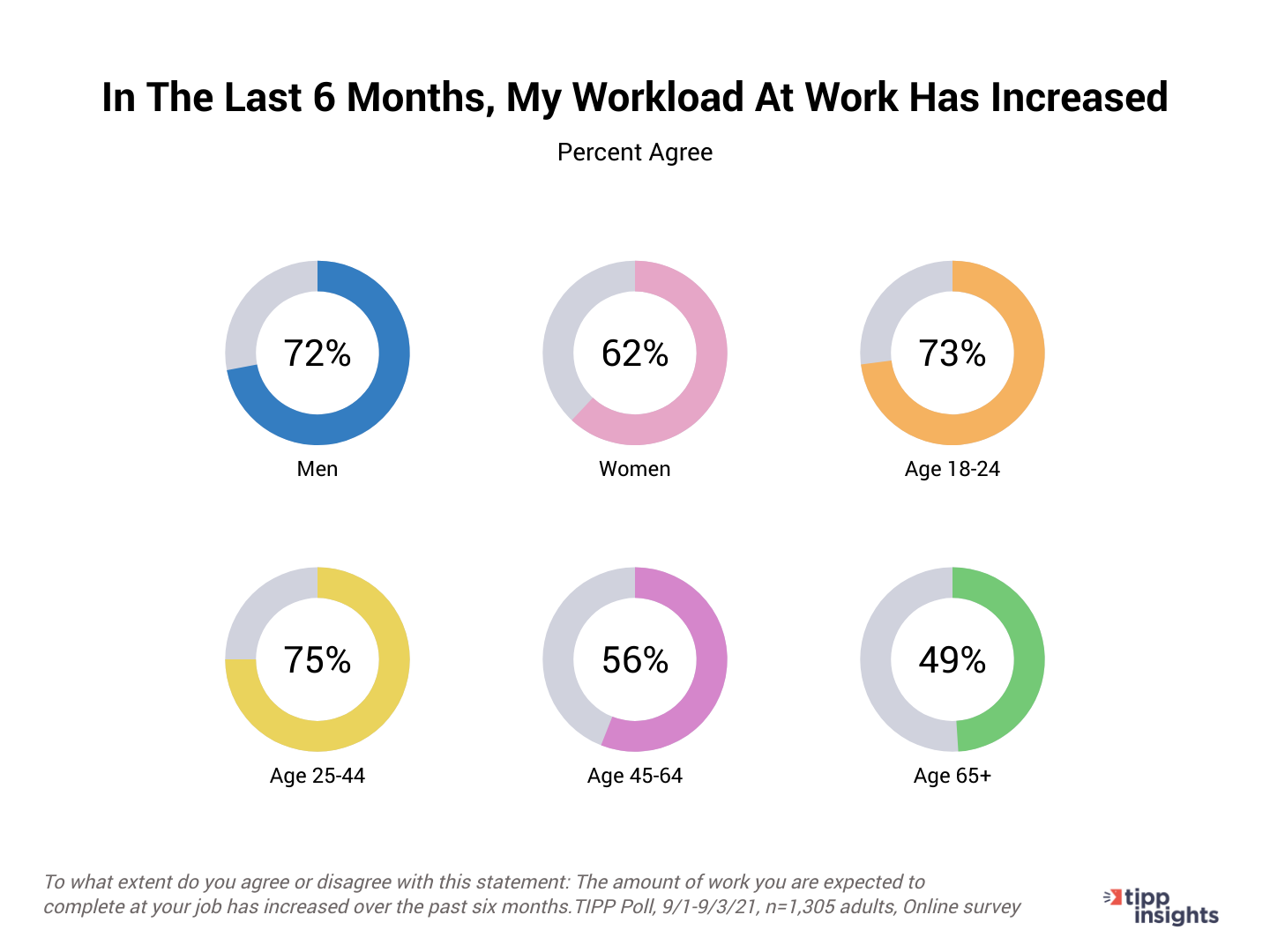If you have an inkling that you’ve been working harder at your job these past six months, you’re not alone.
Of workers who participated in a September TIPP Poll, over 60% between 18 and 64 years of age confessed that the amount of work they’re expected to complete has increased over the past six months. 75% of those between 25 and 44 years of age noticed the greatest increase in their workload.


When it comes to gender, men and women come close in noting an increase in the work they’re expected to get done (men: 72% and women: 62%).
You might think you can relax a little more if you move to another part of the country. Forget that! Our findings show that the increase in work expected to be performed is spread almost evenly across the country.
Ignoring or dismissing your perception of increasing work demands probably isn’t possible; since it’s more than a perception. It’s a FACT. However, you can try a couple of tips that might help you handle this fact:
Tip #1: Give Yourself Permission To Turn Work Off
It’s easy to get caught up in the frenzy of what goes on in the workplace when you look at working as a competitive effort among those with whom you work. For instance, if others on your team are sending out emails at 10 PM, don’t let that pressure you to engage in the same activity.
Instead, take a broader view by recalling what’s really important to “being successful” in your role within your company. In many instances, it’s not the number of hours you work but, more likely, being efficient and delivering quality work – along with being a cooperative team player! Some might call that “working smart.”
Some of my clients find it helpful to set a limit for the number of hours they’ll work in any given week. Nevertheless, consider allowing yourself some flexibility with this self-rule from one week to the next. Taking this more flexible approach helps you avoid clock-watching for self-imposed deadlines and the anxiety that accompanies them. This is especially important if you really like what you do. The point of all this is that you want to stay in control of your work as opposed to letting your work control you!
Tip #2: Identify Your Top Three Deliverables For The Week.
Between Friday and Monday, identify three to five priorities to focus on that you absolutely wish to complete in the coming week.
Once you’ve written down your priorities, fast forward mentally to Friday of that week and imagine them all completed. Then ask yourself: “How closely do these tasks align with my overall goals and objectives?” Choose those that most closely align with your key goals and objectives; then work with the top three of the five priorities on that list. The objective here is to plan a rational limit on your time and energy and leave room for demands that may unexpectedly come your way. Make the necessary revisions before moving forward. By the way, it’s extremely important that you go to your calendar and block out specific times to work on your three top priorities.
Once your top priorities are identified, you’ll want to send a copy to your boss along with a summary of how the previous week went. Very importantly, note which tasks you put on hold or are unintentionally falling behind on. Providing your top deliverables or priorities to your boss will help to ensure alignment with your boss’s expectations. This approach is great for managing any workload. By the way, if you wish, let those other than your boss know of your week’s plan of action. This tip is especially useful when working remotely.
Make a point of checking in after 30 to 60 days to see if your boss or team members find these weekly updates helpful. Why ask? That’s because, typically, others who have put this tip into practice hear nothing from their boss…until they stop sending their updates. That’s when the boss chirps up and asks, “Where are your weekly updates?”
Deborah Bright is the founder and president of Bright Enterprises, Inc., an executive coaching and training organization, and the author of six books, including The Truth Doesn’t Have to Hurt: How to Use Criticism to Strengthen Relationships, Improve Performance, and Promote Change (AMACOM, 2014).
ICYMI













